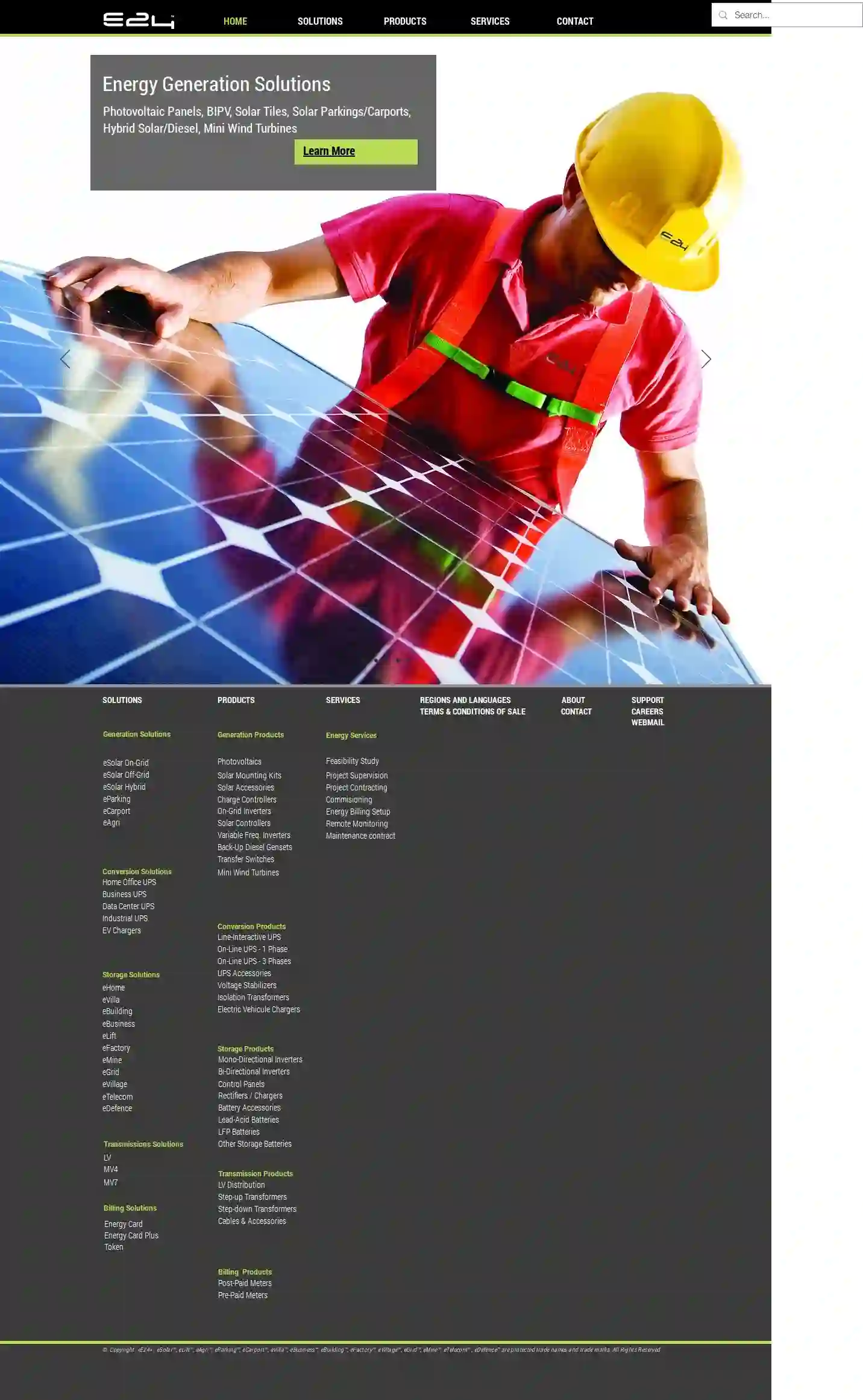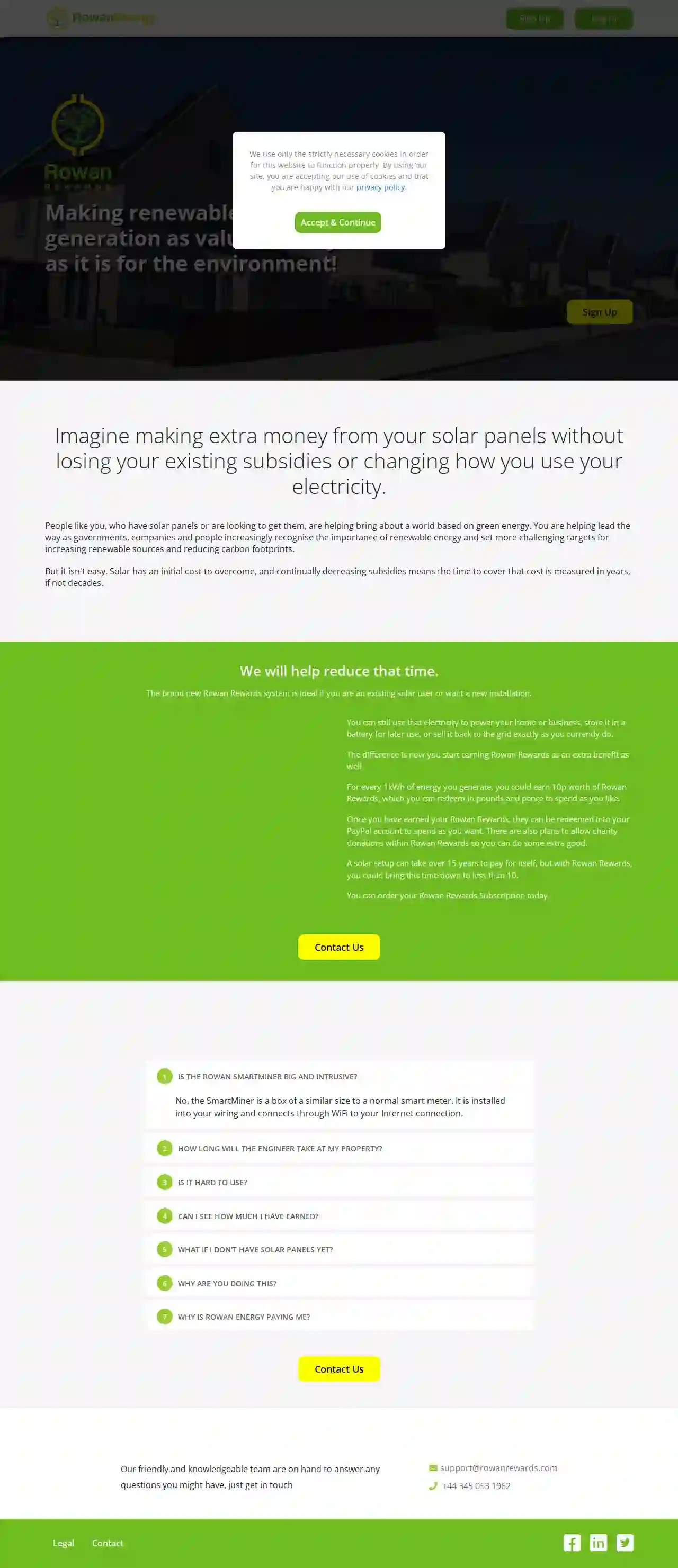Solar Installers Wandsworth
Find the best Solar Installation Company in Wandsworth
Get 3 FREE Solar Panel Installers quotes for your project today! Compare profiles, reviews, accreditations, portfolio, etc... and choose the best offer.

E24 UK
E24 Solutions, 123 Main St, New York, 12345, GBE24 Solutions is a leading provider of energy generation, conversion, storage, and transmission solutions. With a wide range of products and services, we cater to various industries, including residential, commercial, and industrial sectors. Our mission is to empower our customers with reliable and sustainable energy solutions, enabling them to reduce their carbon footprint and increase their energy independence. With a strong focus on innovation, quality, and customer satisfaction, we strive to be the go-to partner for all energy-related needs.
- Services
- Why Us?
- Accreditations
- Gallery
Get Quote
Your Eco
16-17 Old Bond Street, Bath, BA1 1BP, GBWelcome to Your Eco, a Certified B Corp™ company on a mission to deliver clean, sustainable, and affordable solar energy that harmonises: PLANET, PEOPLE, and PROFIT. We craft clean power generation to enhance self-sufficiency with increased control over grid reliance. Together we can reduce your energy bills and help with your carbon reduction goals. Your Eco is dedicated to working towards a carbon neutral future for every situation, working across commercial, construction, private estates & agricultural sectors delivering solar PV and battery storage systems helping power us towards a clean energy future.
- Services
- Why Us?
- Accreditations
- Gallery
Get Quote
Soleos Solar Limited
London, GBSoleos is one of the world's leading EPC service providers. Since its founding in 2012, Soleos has given clients around the world cutting-edge, affordable, sustainable, and reliable solar power solutions. Our Story Vision / Mission Global Leadership Legacy
- Services
- Why Us?
- Gallery
Get Quote
Building Sustainability
London, GBFuture home of something quite cool. If you're the site owner, log in to launch this site. If you are a visitor, check back soon.
- Services
- Why Us?
- Gallery
Get Quote
Save Energy World
4.611 reviewsCedar House, Icon Office 205858 Peregrine Road, Ilford, IG6 3SZ, GBSave Energy Trade World is a leading provider of independent home energy efficiency audits in Ilford and London. Our team of experts can help you reduce your energy bills and enhance your renewable energy applications. With a range of services including PV solar systems, air conditioning, wall insulation, loft insulation, and heat pumps, we can help you make your home energy efficient. Book your independent home energy efficiency audit today and start saving money on your energy bills.
- Services
- Why Us?
- Gallery
Get Quote
Invergy Ltd.
London, GBiNVERGY is bringing the solar industry to new heights with product developments and an optimized energy-cost ratio using advanced technologies. Innovation and sustainability are two core values of INVERGY. iNVERGY is a pioneer in the development of ONGRID Inverter, LFP Battery, Hybrid Inverter, EV Charger and energy storage solutions in conjunction with Mr. Vijay Goel, a prominent UK corporate lawyer and business consultant. The Solutions You Need At iNVERGY, we consider the entire solution rather than just individual components. As a result, we strive to meet a broad range of customer requirements with a single solution. System Monitoring & Accessories System monitoring and integration are made simple with iNVERGY PV data communication solutions. The hardware and software are both very user-friendly. There is an iNVERGY accessory for every need thanks to the wide range of products available. Our Services Expert Customer Care INVERGY have a specialized team of professionals. Call us anytime on our toll free number 18003097880. We will be happy to assist you. Installation Support INVERGY offers hassle-free installation of our products on the site accompanied by expert engineers for total satisfaction of our clients. Transportation/Unloading Aid We have delivered our products in rural as well as urban locations using our trusted transportation partners.
- Services
- Why Us?
- Gallery
Get Quote
Rowan Energy
4.810 reviewsLondon, GBWe use only the strictly necessary cookies in order for this website to function properly. By using our site, you are accepting our use of cookies and that you are happy with our privacy policy. Making renewable energy generation as valuable for you as it is for the environment! Imagine making extra money from your solar panels without losing your existing subsidies or changing how you use your electricity. People like you, who have solar panels or are looking to get them, are helping bring about a world based on green energy. You are helping lead the way as governments, companies and people increasingly recognise the importance of renewable energy and set more challenging targets for increasing renewable sources and reducing carbon footprints. But it isn't easy. Solar has an initial cost to overcome, and continually decreasing subsidies means the time to cover that cost is measured in years, if not decades. We will help reduce that time. The brand new Rowan Rewards system is ideal if you are an existing solar user or want a new installation. You can still use that electricity to power your home or business, store it in a battery for later use, or sell it back to the grid exactly as you currently do. The difference is now you start earning Rowan Rewards as an extra benefit as well. For every 1kWh of energy you generate, you could earn 10p worth of Rowan Rewards, which you can redeem in pounds and pence to spend as you like. Once you have earned your Rowan Rewards, they can be redeemed into your PayPal account to spend as you want. There are also plans to allow charity donations within Rowan Rewards so you can do some extra good. A solar setup can take over 15 years to pay for itself, but with Rowan Rewards, you could bring this time down to less than 10.
- Services
- Why Us?
- Gallery
Get Quote
Solartonic UK Ltd.
London, GBSolar Tonic is a leading provider of solar panel installation and maintenance services in the UK. We are a team of highly skilled and experienced professionals dedicated to providing our clients with the highest quality solar solutions. Our mission is to help our clients reduce their carbon footprint and save money on their energy bills. We offer a wide range of solar panel systems to suit all budgets and needs. Our team will work with you every step of the way to ensure that you get the best possible solar solution for your home or business. We are fully accredited and insured, and we have a proven track record of success. We are committed to providing our clients with exceptional customer service. Contact us today to learn more about how we can help you go solar.
- Services
- Why Us?
- Accreditations
- Gallery
Get Quote
CJ SMART SOLUTIONS
52 reviewsLondon, GBOur site is coming soon. For Quotes please email [email protected]. We are doing some maintenance on our site. It won't take long, we promise. Come back and visit us again in a few days. Thank you for your patience!
- Services
- Why Us?
- Gallery
Get Quote
Green Power Home Services
51 reviewsShenfield, Brentwood, 218 Hutton Road, CM15 8NR, GBBy embracing solar energy for your home, you can enjoy significant cost savings, energy independence, environmental sustainability, increased property value, and the peace of mind that comes with contributing to a cleaner and greener future. At Green Power Solar, we're fully committed to customer satisfaction and value for money. We use our vast experience in the domestic and commercial Solar PV market to ensure you get the best possible advice and service. Our team of engineers have installed thousands of PV systems in homes and businesses across the UK, our success lies in our ability to provide an honest and reliable service to all of our customers, we'll always work with you to install a PV system that's going to work well for your needs. Our installs come with a 10 year workmanship warranty for additional peace of mind. Alongside our installation work we also provide a wide range of maintenance and repair services, from fault fixing to improving the performance of older systems, ensuring that you continue to make the most of your solar installation for years to come.
- Services
- Why Us?
- Accreditations
- Testimonials
- Gallery
Get Quote
Over 3,485+ Solar Contractors on our directory
Our solar contractors operate in Wandsworth & beyond!
SolarCompaniesHub has curated and vetted Top Solar Installers arround Wandsworth. Find a top & trustworthy pro today.
Frequently Asked Questions About Solar Installers
- Solar Panel Warranty: From the panel manufacturer, typically covering defects in materials and workmanship for 10-25 years. Some manufacturers offer performance guarantees, ensuring a certain level of energy output over time.
- Solar Installation Warranty: From the solar installer, covering the quality of the installation work for 1-10 years. This warranty protects you from leaks, faulty wiring, or other issues caused by improper installation.
- Use a Directory Like SolarCompaniesHub: We connect you with pre-screened, qualified solar installers in your area.
- Check Online Reviews: Look for positive reviews on Google, Yelp, and other reputable sources.
- Ask for Referrals: Get recommendations from friends, family, or neighbors who have gone solar.
- Verify Credentials: Ensure the installer is licensed, insured, and certified by reputable organizations (e.g., NABCEP in the US).
- Get Multiple Quotes: Compare quotes from at least 3-4 installers to find the best value for your project.
- Ask Questions: Don't hesitate to ask installers about their experience, warranties, and the process they follow.
- Cash Purchase: The most straightforward option, providing the greatest long-term savings but requiring a larger upfront investment.
- Solar Loans: Loans specifically designed for solar installations, often with favorable terms and interest rates.
- Solar Leases: A third-party company owns the system and leases it to you, allowing you to go solar with little or no upfront cost, but you won't own the system or receive tax benefits.
- Power Purchase Agreements (PPAs): Similar to leases, but you pay for the electricity generated by the system, not the system itself.
- Home Equity Loans or Lines of Credit: Borrow against the equity in your home.
What kind of warranty should I expect for my solar panel system?
How do I find a good solar installer near me?
What is the lifespan of solar panels?
How can I finance my solar panel installation?
What kind of warranty should I expect for my solar panel system?
- Solar Panel Warranty: From the panel manufacturer, typically covering defects in materials and workmanship for 10-25 years. Some manufacturers offer performance guarantees, ensuring a certain level of energy output over time.
- Solar Installation Warranty: From the solar installer, covering the quality of the installation work for 1-10 years. This warranty protects you from leaks, faulty wiring, or other issues caused by improper installation.
How do I find a good solar installer near me?
- Use a Directory Like SolarCompaniesHub: We connect you with pre-screened, qualified solar installers in your area.
- Check Online Reviews: Look for positive reviews on Google, Yelp, and other reputable sources.
- Ask for Referrals: Get recommendations from friends, family, or neighbors who have gone solar.
- Verify Credentials: Ensure the installer is licensed, insured, and certified by reputable organizations (e.g., NABCEP in the US).
- Get Multiple Quotes: Compare quotes from at least 3-4 installers to find the best value for your project.
- Ask Questions: Don't hesitate to ask installers about their experience, warranties, and the process they follow.
What is the lifespan of solar panels?
How can I finance my solar panel installation?
- Cash Purchase: The most straightforward option, providing the greatest long-term savings but requiring a larger upfront investment.
- Solar Loans: Loans specifically designed for solar installations, often with favorable terms and interest rates.
- Solar Leases: A third-party company owns the system and leases it to you, allowing you to go solar with little or no upfront cost, but you won't own the system or receive tax benefits.
- Power Purchase Agreements (PPAs): Similar to leases, but you pay for the electricity generated by the system, not the system itself.
- Home Equity Loans or Lines of Credit: Borrow against the equity in your home.